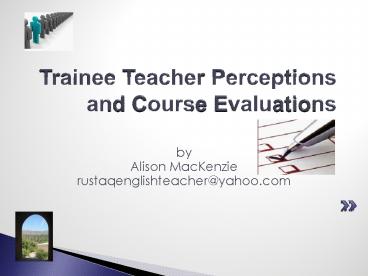Trainee Teacher Perceptions and Course Evaluations - PowerPoint PPT Presentation
1 / 12
Title:
Trainee Teacher Perceptions and Course Evaluations
Description:
Longitudinal study: same sample over an extended period of time ' ... qualitative data. Sampling: purposeful & convenient. Semi ... NEW 'modernization' caution! ... – PowerPoint PPT presentation
Number of Views:44
Avg rating:3.0/5.0
Title: Trainee Teacher Perceptions and Course Evaluations
1
Trainee Teacher Perceptions and Course
Evaluations
- by
- Alison MacKenzie
- rustaqenglishteacher_at_yahoo.com
2
Outline
-
- 1. Introduction
- 2. Research Questions
- 3. Methodology
- 4. Results and Discussion
- 5. Limitations and Implications
- 6. Conclusion
- Comments, Questions and Answers
3
1. Introduction
- c)Literature
- Teacher Training
- Perceptions- (attitudes)
- feelings
- judgments
- predictions
- Evaluation
- Research-Al- Issa (2005)
- Harrison (1996)
? a) Course Evaluations
- ?b)Context purpose
- of the study
- RETROSPECTIVE
4
2. Research Questions
- 1. To what extent do the perceptions of Omani
initial teacher trainees on an end of course
evaluation change after a limited teaching
practice experience in schools ? - 2. What factors account for changes in the
- perceptions on an end of course
- evaluation and after a limited school
- experience ?
5
3. Methodology
- Case study detailed description of teacher
trainee perceptions - Longitudinal study same sample over an extended
period of time - Mixed methods approach quantitative
- qualitative data
- Sampling purposeful convenient
6
Data Collection Analysis
- Semi structured questionnaire x 2
- 13. Which course aspect should definitely be
repeated? A B C D E F G H I J K L - Give a reason for your answer
_ __________________ - 14. What new aspect / s should be added to the
course ? __________________ - 15. Has the course had an affect on you as a
future teacher ? Yes / No - Give a reason for your answer
_ __________________ - ?Quantitative Analysis for ease of comparison
- ?Qualitative Analysis emergent themes
(Radnor2002)
7
4. Results and Discussion
QUANTITATIVE RQ 1
- QUALITATIVE RQ 2
- ?6 themes
- ?Apparent Dichotomies
- ?polar ends of continua, rather than true
opposites (Allwright Bailey, 199162)
- Dont want to be an English Teacher 9 for 1
P - 19 for 2
- F, J P perceptions
8
Relevant VS Irrelevant Because it is
related more to what we are going to do in
schools
Practical VS TheoreticalWe need
to know how to teach practically more than
theories that we dont use
- Important VS Unimportant I didnt feel that it
gives me anything important in teaching EFM
Authentic VS Artificial micro is acting. It
doesnt reflect the real classroom situation
Positive VS Negative emotion She is strict in
correcting exam papers
Practised VS Repetitive I dont like doing the
same routine everyday by going to school to teach
9
5. Limitations and Implications
- Significance
- Teacher Trainer- focus on VE dichotomies
- Evaluator- perceptions may be influenced
- Researcher- retrospective evaluation a more
accurate account of ITT course effectiveness ?
- ?Subjectivity
- Questionnaire design
- Individual perceptions
- No stat analysis (rigor)
- No triangulation (robustness) ?
- Q for FUTURE
- RESEARCH
- Adding to literature
10
6. Conclusion
- NEW ?modernization ?caution!
- This study raised awareness, facilitated
change, offered retrospective evaluation
provided a platform from which the voices of the
next generation of Omani English teachers have
been heard through their perceptions. - Hopefully teachers, trainers and trainees will
respond to curriculum challenges by using course
evaluations to become more dynamic, effective and
critical educators! - Thank you for your
participation.
11
Selected References
- Al- Issa, A. (2005). An ideological discussion of
the impact of the NNESTs english - language knowledge on ESL policy
implementation a special reference to the - omani context. The Asian EFL Journal,
7, 3, 98-112. - Allwright, D. and Bailey, K. (1991). Focus on the
language classroom. - Cambridge Cambridge University Press.
- Barkhuizen, G. (1998). Discovering learners
perceptions of ESL classroom - teaching/learning activities in a
south african context. TESOL Quarterly, 32, 1,
85108. - Brown, J. (1995). The elements of language
curriculum a systematic approach - to program development. Boston Heinle
Heinle. - Cohen, L., Manion, L. and Morrison, K. (2000).
Research methods in education. - London Routledge.
- Davies, A. (2006). What do learners really want
from their EFL course? - ELT Journal, 60, 1, 3-12.
12
- Harrison, I. (1996). Look whos talking now
listening to voices in curriculum renewal. In - Bailey, K. and Nunan, D. (eds.). Voices
from the language classroom qualitative - research in second language education
(pp. 283- 303). - Cambridge Cambridge University Press.
- Mann, G. (2004). An evaluation approach towards
feedback betterment in an - initial teacher training in EFL. The
Asian EFL Journal, 6, 1. Retrieved July 15, 2007,
from - http//www.asian-efl-journal.com/04_gm
.php - Nunan, D. (1992). Research methods in language
teaching. Cambridge CUP - Pennycook, A. (1990). Comments on martha c.
pennington and aileen l. youngs - approaches to faculty evaluation for
ESL a reader reacts - TESOL Quarterly, 24, 3, 555-559.
- Radnor, H. (2002). Researching your professional
practice doing interpretive - research. Buckingham Open University
Press. - Richards, K. (2003). Qualitative inquiry in
TESOL. New York Palgrave Macmillan. - Sharp, A. (1990). Staff/student participation in
course evaluation a procedure - for improving course design. ELT
Journal, 44, 2, 132-137.































